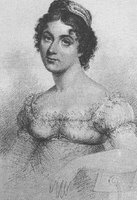
Since my confession last week that I’m a commuter reader, I wanted to tell you about my current sensational read on the train, The Courtesan’s Revenge by Frances Wilson, subtitled Harriette Wilson, the Woman who Blackmailed the King. And what a wild ride it is!

“Revenge writing is a female genre,” comments Wilson. “Men who have been left by women or made cuckolds by rivals either lick their wounds in humiliated silence or start the Trojan Wars.” Harriette Wilson had a grand time gleefully mocking her aristocratic lovers in her infamous Memoirs, published in installments to an enthralled public. Full of inaccuracies, but equally full of life, the Memoirs are the best in creative non-fiction. But her voice is true, impudent, and devastating. Here’s an encounter with the Duke of Wellington (in whom she later inspired the comment “Publish and be damned”):
Wellington called on me, the next morning before I had finished breakfast. I tried him on every subject I could muster. On all, he was inpenetrably taciturn. At last he started an original idea of his own…
“I wonder you do not get married, Harriette.”
(Bye-the-bye, ignorant people are always wondering.)
“Why so?”
Wellington, however, gives no reason for anything unconnected with fighting, at least since the convention of Cintra; and he therefore again became silent. Another burst of attic sentiment burst forth.
“I was thinking of you last night, after I got into bed.”
“How very polite to the Duchess,” I observed.
On another gentleman …[he] had long been our family’s friend, equally at hand to congratulate us on our marriages, our simple fornications, our birthdays, or our unexpected deaths…
As a courtesan she occupied a unique position in society–because she was fashionable, both the respectable and the dissolute were drawn to her. One of my favorite excerpts in the book is an account of a journey she took (to chase down her current protector and the money he owed her) in the company of a friend’s maiden aunt with the family’s full blessing and some emergency updating of the lady’s twenty-five year old wardrobe.
“I am old enough and thank God I am no beauty,” Aunt Martha declared, “and I may do what I please with my little fortune. I have never been ten miles from my native place and I want to see the world!”
Now that’s a mind-boggling thought–Mary Crawford on a road trip with Miss Bates. One of those things you’d never get away with in fiction…

LOL (and I don’t LOL lightly) over Mary Crawford and Miss Bates.
Pam
Ditto on the LOL!
I must read this sometime.
Elena 🙂
I read Harriet Wilson’s Memoirs a long long time ago, and found them fascinating. I’ve forgotten most of it by now, but two things really stick in my mind:
In one scene, Harriet is going by stage coach (or something like that) and wants to disguise herself as a middle-class person. Her friends tell her it will never work, because everyone will be able to tell her corsets are too well made for any middle-class lady! 🙂
I forget the other thing that sticks in my mind. 🙂
Cara (feeling a little silly today)
What? Little Harry wrote a memoir about her “friends”? How scandalous. How delightful. I must run out and find a copy. I wonder if I’m in it?
Bertie the Beau
Mr. St. James,
I assure you that you would have emptier pockets if you did not appear in Miss Wilson’s book. But I am shocked–shocked; pray tell me you (as one of our more recent leaders said) did not have sex with that woman.
Janet
Oh, good heavens! How indelicate you are, Madame Mullany. I am quite shocked.
To (blushingly) answer your question — of course not. Why indeed would I? I never do anything that cannot be done while dressed exquisitely — and completely.
Bertie the rather red
Bertie, Dear Chap,
You never do ANYTHING that can’t be done completely dressed? What about all these showers you’ve been telling us about?! What must they be doing to your neckcloths?!!!!
Todd-who-has-had-the-starch-quite-taken-out-of-him
On Harriet Wilson: it is interesting how biographers tend to start identifying with their subjects. In her biography of Wellington, Elizabeth Longford completely dismisses the stories about him in Harriet Wilson’s memoirs, and points out that the book was, to a large extent, an attempt to extort money out of various aristocrats (to keep their names out of the book). Hence the “Publish and Be Damned” comment.
Todd-who-thinks-publishing-is-a-good-thing-for-writers-to-do